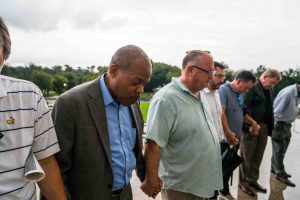A few days from now, several hundred representatives from various entities of the Cumberland Presbyterian Church (CPC) and the Cumberland Presbyterian Church in America (CPCA) will descend on Nashville, TN. For the CPC, it will be the 186th such gathering, while it will be the 141st for the CPCA. Of no small significance is the possibility that this year, each group’s Assembly may be one of its last. That is, if our two denominations—meeting concurrently this year—can agree upon and execute a viable path to unification, we will soon be scheduling the First General Assembly of, well, whatever we decide to call ourselves.
To be sure, the path to successful unification has not been an easy one to travel. Nor will it get any easier, I suspect. It is a path lined on either side by high weeds and thickets, and strewn with roots and stones that threaten to trip us up if we’re not vigilant. There are some clearly marked forks in the path, offering multiple ways of reaching our destination but demanding that we prioritize our route in terms of the speed with which we wish to get there, who will lead and who will follow, and the resources that we have available to sustain us along the way. There are also some not-so-clearly-marked forks that look as if they offer alternative paths to our goal, but which may actually lead us back to the wilderness from which we came…
Navigating through outdoor wildernesses—especially those with which I’m unfamiliar—has been a passion of mine for much of my life. There are, of course, manifold dangers involved in traveling through unknown territory; I have found, however, that diligent study of the area in which you will be traveling (before you enter it), a collection of essential supplies (e.g., water, shelter, map, compass, etc.), and healthy doses of both humility and awareness of your surroundings are essential elements in mitigating those dangers.
Of course, having a clear vision of the goal toward which you’re striving is a key factor in whether you’re ultimately successful or not in reaching it. As I see it, though, to really make such a journey worth the effort, one thing in particular is imperative: a determination to use the time you spend along the way to learn as much as you possibly can not only about your surroundings, but about yourself and any traveling companions you may have as well.
In other words, while a commitment to reach the goal one has envisioned is important, there is often as much value in the journey itself as there is in reaching the final destination—and sometimes, even more. We have, I think, an opportunity to realize significant value from our journey toward unification—whether we are ultimately successful in reaching that goal or not.
What value may we derive from this journey? What can we learn that isn’t dependent on our ultimate success for validation? In this issue, Stated Clerk of the General Assembly of the CPCA Craig White offers his perspective on the “why?” of unification. In laying out the basis for his concluding answer to that question, he lists numerous ways in which the CPCA and the CPC are virtually indistinguishable—discoveries he has made as a result of his part of this journey.
Our meetings of Presbytery, Synod, and General Assembly share many of the same qualities: opportunities for joyous worship of the Triune God, wonderful meals and fellowship, and (let’s face it) business sessions that are often tedious, sometimes contentious, but almost always focused on discerning and executing God’s will as best we can.
While I’m sure that Brother White “knew” these things intellectually well before his work on the Unification Task Force, it is clear to me that the actual experience of the many things we hold in common has played an important role in his support for unification. He hasn’t said so—at least to me—but it would not surprise me if there have been some times when he felt there was a great deal of thrashing about in the weeds and thickets along the way or when the forks in the path weren’t so clearly marked. But I do know that such thrashing has occurred in both denominations… We are, as Brother White observes, more alike than we are different.
We have an opportunity, as I see it (and yes, I’ve said this before—but am convinced it bears repeating), to provide the world a shining example of what God’s love is all about. We have an opportunity to bear witness to the power of that love and its ability to overcome the differences that we humans have appropriated as justification for division and exclusion, but that God surely sees as elements of God’s design. In a society where intolerance and demonization of those who are different from us—either by ethnicity, or religion, or social strata, or gender, or sexual orientation, or culture, or race, or theology, or ideology—are often the accepted standards governing human interaction, we who share a common Confession can become the proverbial light on the hill, if only we will.
As I see it, if the ultimate destination on which we focus our attention is a union that is “legal”, blessed by civil courts, then the jury is still out in terms of whether we’ll be successful—and perhaps even in terms of whether it’s truly God’s will. If, on the other hand, our clear vision of the goal toward which we strive is focused on truly correcting the wrongs of the past—creating a union that rejoices in and celebrates our diversity for the glimpse it provides the world of God’s kingdom—then it is difficult for me to see how we can fail.




Leave a Reply
Your email is safe with us.